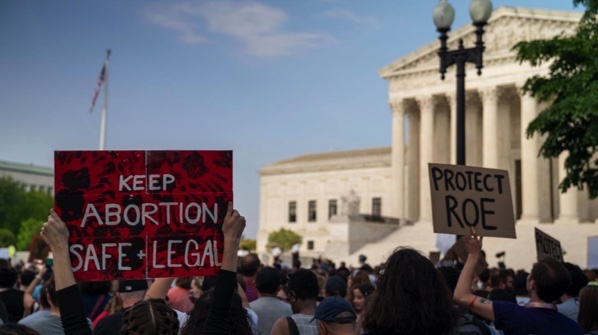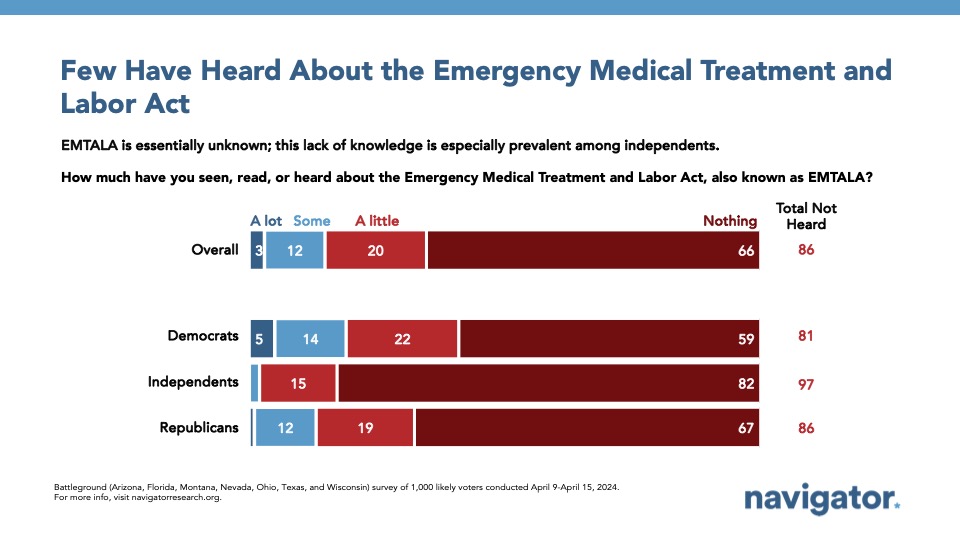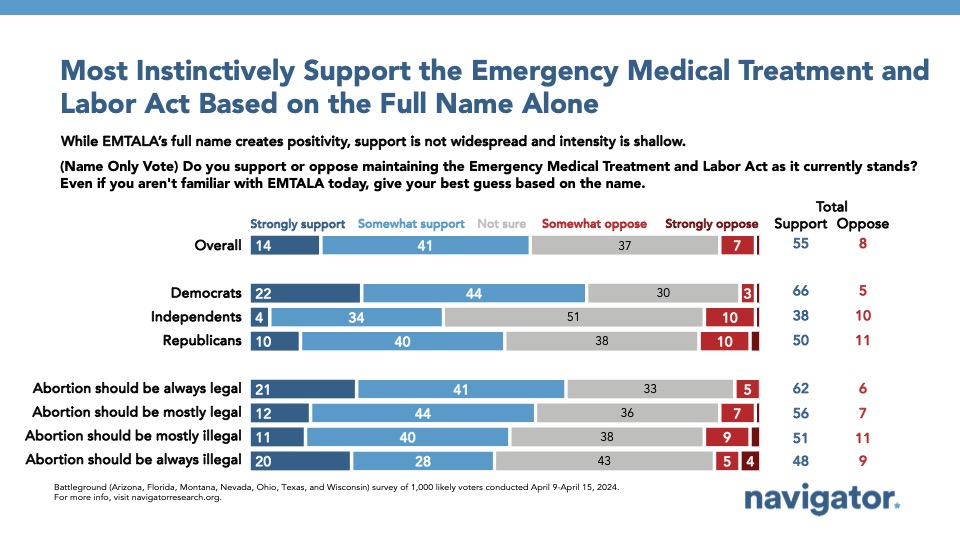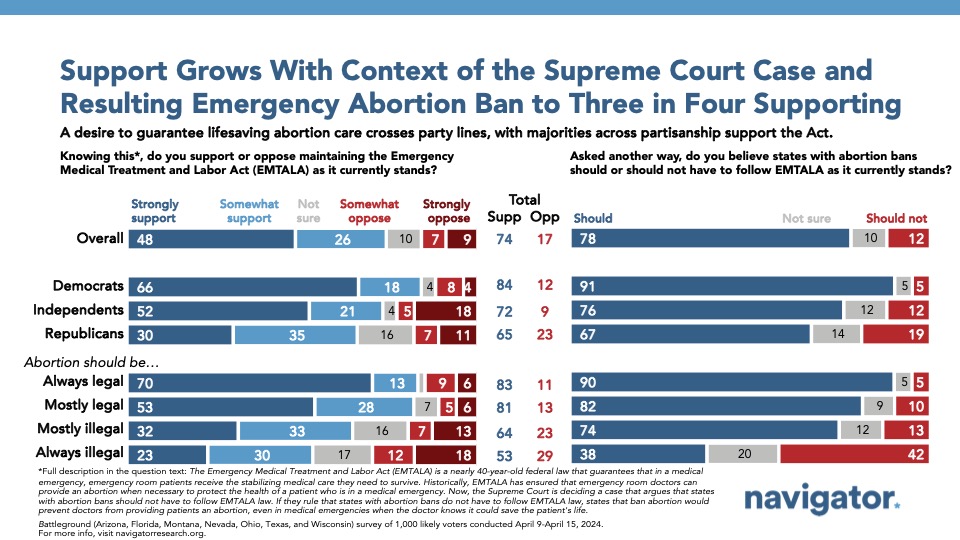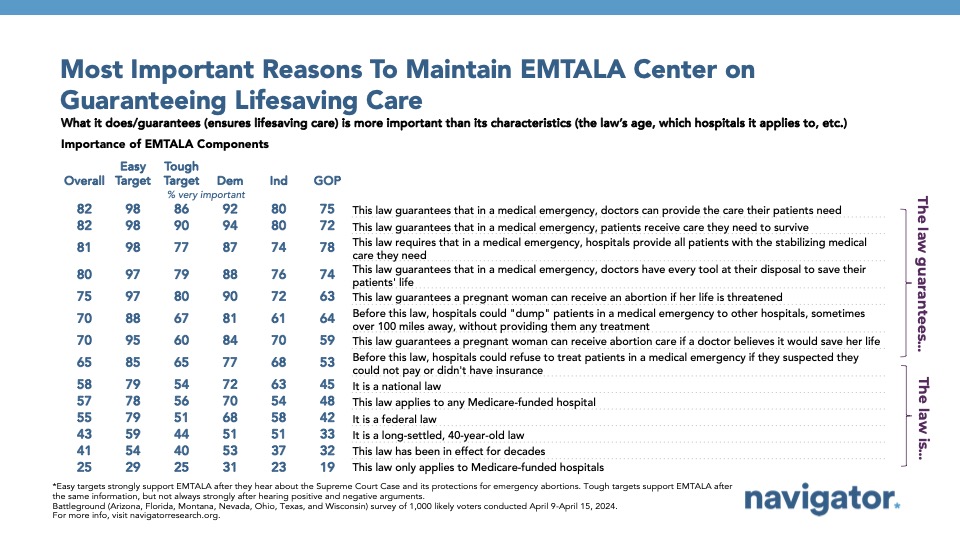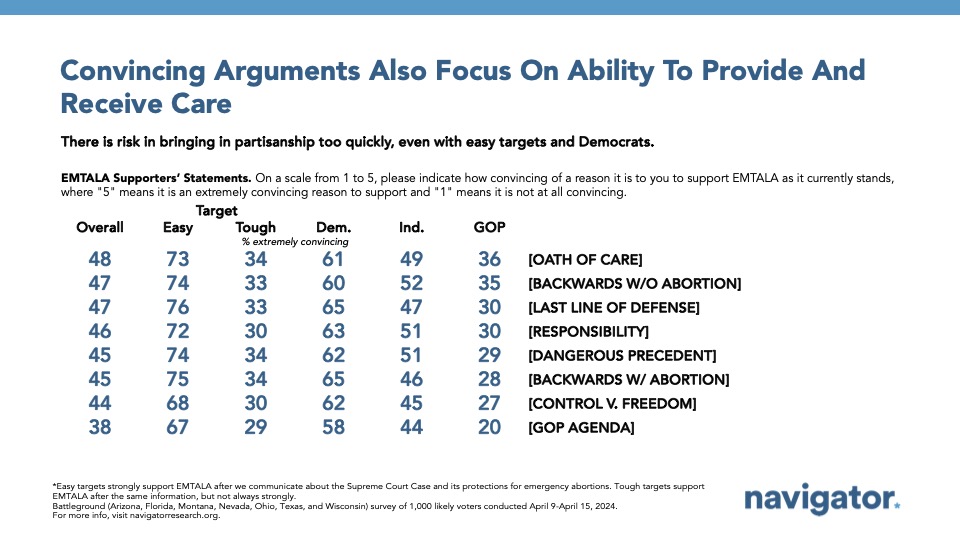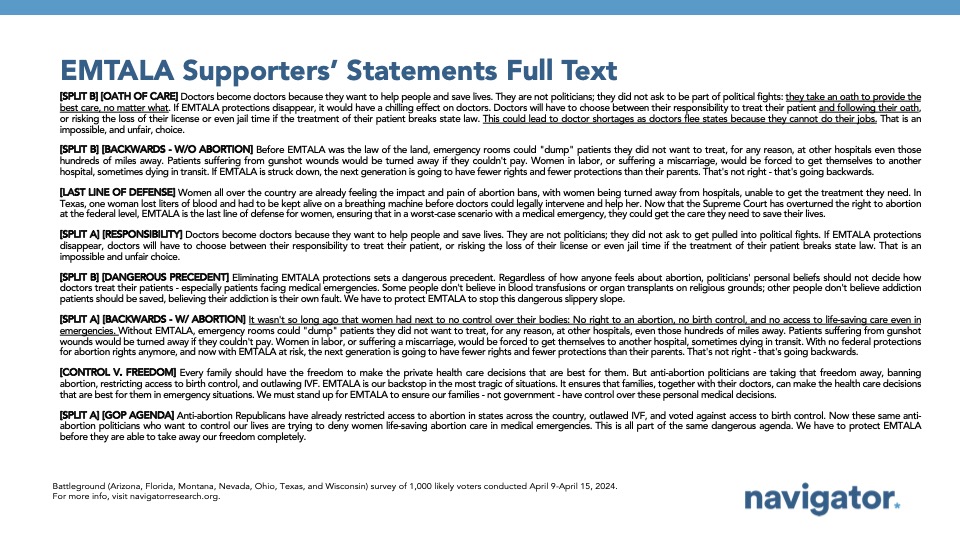Poll: EMTALA and Lifesaving Care
This Navigator Research report contains polling data on how Americans in states with potential abortion bans and protections view the Emergency Medical Treatment and Labor Act (EMTALA) ahead of the oral arguments at the Supreme Court, including support for maintaining the law and whether states with abortion bans should have to follow the law.
READ THE MEMO HERE
Over four in five in states with potential abortion bans or protections have not seen, read, or heard some about the Emergency Medical Treatment Labor Act (EMTALA).
Just 15 percent have heard “some” (12 percent) or “a lot” (3 percent) about the Court hearing a case on the constitutionality of EMTALA, while an additional 20 percent have heard “little” and two in three have heard “nothing at all” (66 percent). Awareness is low across partisan lines, with over four in five Democrats (81 percent), Republicans (86 percent), and independents (97 percent) reporting to know “little” or “nothing” about the case.
- With no additional context of the case, a majority of those in states with potential abortion bans support maintaining the Emergency Medical Treatment and Labor Act as it currently stands (55 percent support – 8 percent oppose), while 37 percent are unsure. Independents start net positive at +28, but a majority start unsure about it (38 percent support – 10 percent oppose – 51 percent unsure).
Support for maintaining lifesaving care protections is fervent across party lines when information about the case is introduced.
When described as “the Emergency Medical Treatment and Labor Act (EMTALA) is a nearly 40-year-old federal law that guarantees that in a medical emergency, emergency room patients receive the stabilizing medical care they need to survive… historically, EMTALA has ensured that emergency room doctors can provide an abortion when necessary to protect the health of a patient who is in a medical emergency… now, the Supreme Court is deciding a case that argues that states with abortion bans should not have to follow EMTALA law… if they rule that states with abortion bans do not have to follow EMTALA law, states that ban abortion would prevent doctors from providing patients an abortion, even in medical emergencies when the doctor knows it could save the patient’s life,” three in four support maintaining the law (net +57; 74 percent support – 17 percent oppose), including 84 percent of Democrats, 72 percent of independents, and 65 percent of Republicans.
- Further, nearly four in five agree that states with abortion bans should have to follow EMTALA as it currently stands, which would allow doctors to provide women an abortion in a medical emergency (78 percent), including 91 percent of Democrats, 76 percent of independents, and 67 percent of Republicans.
- Seven in ten agree that “lifesaving care” is most important for doctors to provide to patients (70 percent), compared to “emergency care” (21 percent) or “stabilizing care” (9 percent).
The most important reasons to maintain EMTALA center on guaranteeing lifesaving care.
More than nine out of ten believe the most important reasons to maintain lifesaving care protections are the guarantees that doctors are able to provide the care patients need and that patients are able to receive the care they need to survive. Over nine in ten see the following reasons as important to keep EMTALA as it currently stands, including over four in five who think they are “very” important:
- This law guarantees that in a medical emergency, doctors can provide the care their patients need (96 percent important, including 82 percent “very” important);
- This law guarantees that in a medical emergency, patients receive care they need to survive (96 percent important, including 82 percent “very” important);
- This law guarantees that in a medical emergency, hospitals provide all patients with the stabilizing medical care they need (96 percent important, including 82 percent “very” important); and,
- This law guarantees that in a medical emergency, doctors have every tool at their disposal to save their patients’ life (96 percent important, including 82 percent “very” important).
The most convincing arguments focus on the ability to receive and provide care.
The most convincing reasons to maintain lifesaving care protections similarly focus on doctors’ ability to focus on care — not political fights — as well as future generations being able to receive the lifesaving care they need. Nearly three in four find the following most convincing to maintain lifesaving care protections:
- Before EMTALA was the law of the land, emergency rooms could “dump” patients they did not want to treat, for any reason, at other hospitals even those hundreds of miles away. Patients suffering from gunshot wounds would be turned away if they couldn’t pay. Women in labor, or suffering a miscarriage, would be forced to get themselves to another hospital, sometimes dying in transit. If EMTALA is struck down, the next generation is going to have fewer rights and fewer protections than their parents. That’s not right that’s going backwards (73 percent convincing); and,
- Doctors become doctors because they want to help people and save lives. They are not politicians; they did not ask to be part of political fights: they take an oath to provide the best care, no matter what. If EMTALA protections disappear, it would have a chilling effect on doctors. Doctors will have to choose between their responsibility to treat their patient and following their oath, or risking the loss of their license or even jail time if the treatment of their patient breaks state law. This could lead to doctor shortages as doctors flee states because they cannot do their jobs. That is an impossible, and unfair, choice (72 percent convincing).
About The Study
Global Strategy Group conducted a survey of 1,000 likely 2024 Senate Battleground voters between April 9 and April 15, 2024. Battleground states include Arizona, Florida, Montana, Nevada, Ohio, Texas, and Wisconsin. The survey has a margin of error of +/- 3.1%. Care has been taken to ensure the geographic, political, and demographic divisions of the population of likely voters are properly represented.
